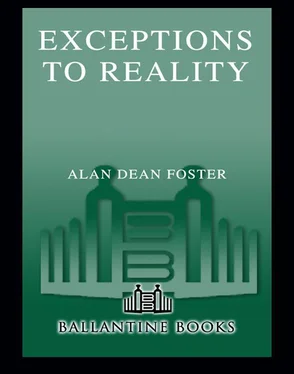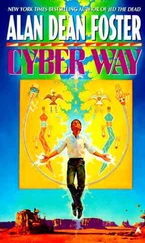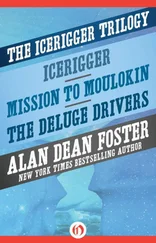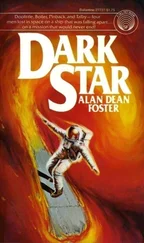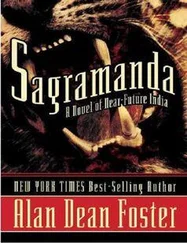Alan Foster - Exceptions to Reality
Здесь есть возможность читать онлайн «Alan Foster - Exceptions to Reality» весь текст электронной книги совершенно бесплатно (целиком полную версию без сокращений). В некоторых случаях можно слушать аудио, скачать через торрент в формате fb2 и присутствует краткое содержание. Жанр: Старинная литература, на английском языке. Описание произведения, (предисловие) а так же отзывы посетителей доступны на портале библиотеки ЛибКат.
- Название:Exceptions to Reality
- Автор:
- Жанр:
- Год:неизвестен
- ISBN:нет данных
- Рейтинг книги:4 / 5. Голосов: 1
-
Избранное:Добавить в избранное
- Отзывы:
-
Ваша оценка:
- 80
- 1
- 2
- 3
- 4
- 5
Exceptions to Reality: краткое содержание, описание и аннотация
Предлагаем к чтению аннотацию, описание, краткое содержание или предисловие (зависит от того, что написал сам автор книги «Exceptions to Reality»). Если вы не нашли необходимую информацию о книге — напишите в комментариях, мы постараемся отыскать её.
Exceptions to Reality — читать онлайн бесплатно полную книгу (весь текст) целиком
Ниже представлен текст книги, разбитый по страницам. Система сохранения места последней прочитанной страницы, позволяет с удобством читать онлайн бесплатно книгу «Exceptions to Reality», без необходимости каждый раз заново искать на чём Вы остановились. Поставьте закладку, и сможете в любой момент перейти на страницу, на которой закончили чтение.
Интервал:
Закладка:
An eternity later he became feebly aware that the light around him was strengthening. Had the night passed so quickly? Or was his perception of time failing faster than his other senses? The omnipresent fog and drizzle prevented the sun from reaching the surface, from warming him. Closer to Heaven he might be, but here it was wet and gray.
Searching for more solid ground, he dragged himself with infinite patience away from the bog until his hand wrapped around something hard and almost dry. A solid piece of wood at last. But when he struggled to pull himself higher it came apart in his fingers. Blinking, he examined it weakly in the saturated light. It was not brown, but white. With a great effort he managed to raise his head.
Not one, but two deteriorating skeletons lay just above him, entangled in the trees where they had collapsed. Scraps of rotting, disintegrating clothing clung to the bone-white shoulders and hips. Like desiccated string, a few vestiges of tendons hung slack from the limbs. Exotic mosses and small ferns flourished in the vacant body cavities, having fed well on the now decomposed flesh.
Kinkaid, he thought. Masaki. Or maybe just a pair of disoriented, unlucky hikers. Without a detailed forensic analysis, there was no way to know. Had they been drawn here, too, by the song of the akialoa? Drawn to what? A nesting place, perhaps. Or maybe a courtship ground, where hopeful males displayed their most colorful feathers and warbled their most enchanting songs.
From somewhere very close by, an akialoa greeted the morning with the rarest song in the world.
Kinkaid, Masaki, and now him. Everything risked for fame and modest fortune. All to try to help a wonderful, unique bird, and all for naught. How ironic it was that a man should die of hypothermia in the midst of a swamp. He pushed on, staggering and falling, struggling to his feet, always following the song.
He did not know how much time had passed when the sun finally came out. The warmth was as unexpected as it was welcome. With dryness came a rush of renewed strength and determination. Knowing he ought to turn back, he pushed on. Not the wisest of decisions, perhaps, but having come this far and endured so much, he felt he had no choice.
Then he saw them.
They were perched in a cluster of trees green with epiphytes and bromeliads, bejeweling the branches with the brilliance of their plumage. His jaw dropped in wonderment. A pair of black momo sat preening themselves, their own shorter sickle-bills digging parasites from beneath their wings. Nearby, a flock of greater amahiki chattered away like so many lime-green mockingbirds. With its thick, heavy beak, a greater koa finch was plucking caterpillars from the trunk of an isolated tree, while overhead a trio of o‘o‘ flashed their extraordinary tail feathers and brilliant gold wing tufts. Crow-sized kioea yelled at diminutive red-and-gray ula-ai-hawane. It seemed as if all the extinct, beautiful birds of Hawaii had gathered in this one place, just waiting for the sun to come out in the Alakai. Waiting for him.
Then he heard the song again, and there they were. Not one, not two, but three pairs cavorting in the tree directly ahead of him, singing their approval of the rare appearance of the sun. The males were seven to seven and a half inches long, bright olive-yellow above and yellow below, the gray-green females slightly smaller. And those amazing, astonishing bills, unequaled anywhere in the kingdom of birds. There was a nest, too. Hearing the peeping of chicks, he hardly dared to breathe. Ever so slowly, he reached for his camera.
It wasn’t there. He must have dropped it while running and slogging through the swamp, he realized. No matter. With such a sight as no ornithologist of his generation could dare to dream of spread out before him, it was enough simply to sink to his knees and stare, and stare. Spreading his arms out to his sides, he drank in the sight and the sun. And smiled.
Sanchez wasn’t with the search party that stumbled across Loftgren’s body early the following year, but Fanole was. The guide recognized the remnants of the ornithologist’s boots as he rechecked his group’s position on the new GPS he carried. He had to check it three times. Each time, his amazement grew. Without food or proper clothing, the haole researcher had somehow made it halfway up the side of Mount Waialeale itself.
Two of the Forest Service rangers on expedition with the guide peered over his shoulder. “Know him?”
Fanole nodded, resting an arm across one thigh. “Bird prof. Went running off into the depths by himself last year. His graduate student and I spent a day searching for him before we turned and got out. Barely made it.” He thought back. “That was two days before Tropical Storm Omolu hit the island.”
“Poor son-of-a-bitch.” The taller ranger wiped moisture from his face beneath the rain hood. “What a way to die.”
“I dunno.” His companion cocked his head slightly to one side. “He looks kind of peaceful to me.”
Fanole grunted, straightened. “We’ll have to mark the location. Another crew can haul out the body.”
“That’s for sure.” The first ranger started to turn away, hesitated, looked back and frowned. “What’s that he’s holding in his right hand?”
The other ranger squinted. Fanole had already started back toward their bivouac. “Plant stuff. Fern leaf, I think. I don’t guess that he’s holding anything. Fingers contracted while dying.” He sighed and shook his head sadly. “Rigor mortis.”
Still, the taller man hesitated. Then he shrugged and started after his companion. “Funny. For just a second there I thought they were feathers.”
Growth
An awful lot has happen to the characters of Flinx and his pet minidrag, Pip, since they first appeared in The Tar-Aiym Krang thirty-five years ago. Having matured both physically and mentally, Flinx has gone from being a pretty aimless teenager to someone (or perhaps something) of immense importance to everyone around him. It’s not a destiny he sought. But like so many of us, he can’t escape the inexorable. That does not mean he wouldn’t like to do so.
As a consequence of who he is and what he may yet become, all manner of individuals and even entire societies have acquired an interest in what happens to him. Sometimes even without him being aware of it…
There was nodenying that there were times when Flinx enjoyed being alone. One of the few times he could allow himself to relax was in transit. Because when traversing the immense distances between the stars he was spared the constant, puerile emotional babble of supposedly sentient individuals who collectively gave “higher intelligence” a bad name. Though interstellar travel did not entirely relieve him of his recurring headaches, the debilitating attacks were considerably reduced in number when he was by himself.
Of course, he was not entirely alone on the ship. Pip, the empathetic Alaspinian minidrag and his constant companion since youth, was with him. He could also count on the presence of the Teacher ’s advanced AI. For an automaton, it was a pleasant, sophisticated presence—and unlike the interminably gibbering mass of humanxkind, one he could simply shut down whenever he grew tired of the conversation.
Man and machine were chatting now as Flinx relaxed in the lounge. With its artificial pond, waterfall, and small forest, it was his favorite part of the ship. The Ulru-Ujurrians who had presented him with the craft had left the relaxation chamber comparatively bare and utilitarian in both content and design. Employing the ship’s automatics, Flinx had modified it repeatedly over the years.
Now as he reclined on the couch-lounge, he allowed music and the remnants of a good meal to slowly overtake consciousness. As he slipped sleepward, the AI’s thoughtful voice grew fainter and fainter. Gliding toward him from her perch in one of the many decorative live plants that composed the tiny woodland, Pip furled her wings as she landed on his chest. Coiling against his ribs, emotionally surfing his current wave of contentment, she shut her own eyes and joined him in sleep.
Читать дальшеИнтервал:
Закладка:
Похожие книги на «Exceptions to Reality»
Представляем Вашему вниманию похожие книги на «Exceptions to Reality» списком для выбора. Мы отобрали схожую по названию и смыслу литературу в надежде предоставить читателям больше вариантов отыскать новые, интересные, ещё непрочитанные произведения.
Обсуждение, отзывы о книге «Exceptions to Reality» и просто собственные мнения читателей. Оставьте ваши комментарии, напишите, что Вы думаете о произведении, его смысле или главных героях. Укажите что конкретно понравилось, а что нет, и почему Вы так считаете.
